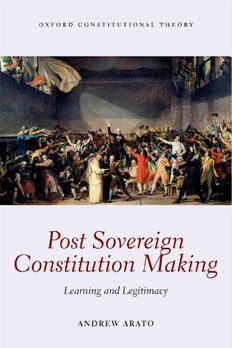
Post Sovereign Constitutional Making: Learning and Legitimacy PDF
Preview Post Sovereign Constitutional Making: Learning and Legitimacy
OXFORDCONSTITUTIONALTHEORY SeriesEditors: MartinLoughlin,JohnP.McCormick,andNeilWalker Post Sovereign Constitution Making OXFORDCONSTITUTIONALTHEORY SeriesEditors: MartinLoughlin,JohnP.McCormick,andNeilWalker OxfordConstitutionalTheoryhasrapidlyestablisheditself astheprimarypointof ref- erencefortheoreticalreflectionsonthegrowinginterestinconstitutionsandconstitu- tional law in domestic, regional and global contexts. The majority of the works publishedintheseriesaremonographsthatadvancenewunderstandingsof theirsub- ject.Buttheseriesaimstoprovideaforumforfurtherinnovationinthefieldbyalso includingwell-conceivededitedcollectionsthatbringavarietyof perspectivesanddis- ciplinaryapproachestobearonspecificthemesinconstitutionalthoughtandbypub- lishingEnglishtranslationsof leadingmonographsinconstitutionaltheorythathave originallybeenwritteninlanguagesotherthanEnglish. ALSOAVAILABLEINTHESERIES PopularSovereigntyinEarlyModern TheThreeBranches ConstitutionalThought AComparativeModelofSeparation DanielLee ofPowers ChristophMöllers TheCulturalDefenseofNations ALiberalTheoryofMajorityRights TheGlobalModelofConstitutionalRights LiavOrgad KaiMöller TheCosmopolitanConstitution TheTwilightofConstitutionalism? AlexanderSomek EditedbyPetraDobnerandMartinLoughlin TheStructureofPluralism BeyondConstitutionalism VictorM.Muniz-Fraticelli ThePluralistStructureofPostnationalLaw NicoKrisch ConstitutionalCourtsandDeliberative Democracy ConstitutingEconomicandSocialRights ConradoHübnerMendes KatharineG.Young FaultLinesofGlobalization ConstitutionalReferendums LegalOrderandthePoliticsofA-Legality TheTheoryandPracticeofRepublican HansLindahl Deliberation StephenTierney TheCosmopolitanState H.PatrickGlenn ConstitutionalFragments SocietalConstitutionalismand AfterPublicLaw Globalization EditedbyCormacMacAmhlaigh,Claudio GuntherTeubner Michelon,andNeilWalker Post Sovereign Constitution Making Learning and Legitimacy AndrewArato DorothyHartHirshonProfessorof Political andSocialTheory,TheNewSchool (cid:2)(cid:3) 1 1 GreatClarendonStreet,Oxford,OX26DP, UnitedKingdom OxfordUniversityPressisadepartmentoftheUniversityofOxford. ItfurtherstheUniversity’sobjectiveofexcellenceinresearch,scholarship, andeducationbypublishingworldwide.Oxfordisaregisteredtrademarkof OxfordUniversityPressintheUKandincertainothercountries ©A.Arato2016 Themoralrightsoftheauthorhavebeenasserted FirstEditionpublishedin2016 Impression:1 Allrightsreserved.Nopartofthispublicationmaybereproduced,storedin aretrievalsystem,ortransmitted,inanyformorbyanymeans,withoutthe priorpermissioninwritingofOxfordUniversityPress,orasexpresslypermitted bylaw,bylicenceorundertermsagreedwiththeappropriatereprographics rightsorganization.Enquiriesconcerningreproductionoutsidethescopeofthe aboveshouldbesenttotheRightsDepartment,OxfordUniversityPress,atthe addressabove Youmustnotcirculatethisworkinanyotherform andyoumustimposethissameconditiononanyacquirer CrowncopyrightmaterialisreproducedunderClassLicence NumberC010000148withthepermissionofOPSI andtheQueen’sPrinterforScotland PublishedintheUnitedStatesofAmericabyOxfordUniversityPress 198MadisonAvenue,NewYork,NY10016,UnitedStatesofAmerica BritishLibraryCataloguinginPublicationData Dataavailable LibraryofCongressControlNumber:2015960808 ISBN978-0-19-875598-2 Printedandboundby CPIGroup(UK)Ltd,Croydon,CR04YY LinkstothirdpartywebsitesareprovidedbyOxfordingoodfaithand forinformationonly.Oxforddisclaimsanyresponsibilityforthematerials containedinanythirdpartywebsitereferencedinthiswork. ForJeanandJulian Preface Thisbookisthirdinaseriesof studiesdealingwiththenewworldof constitu- tionalpoliticsthatopenedwiththeSpanishtransitiontodemocracyandbecame moreuniversalinthe1990s.Inthefirst,CivilSociety,ConstitutionandLegitimacy (2000),IfocusonEastCentralEurope,whileinthesecond,ConstitutionMaking Under Occupation (2009), I examine the perhaps unlikely case of Iraq under Americanrule.Thepresentvolumeresumesthestudyoftheformerstatesocial- ist countries, with the case of Hungary, as well as the Middle East with an extendedstudyof constitutionmakinginTurkey.Itspurposeisnotonlycom- parative,butprimarilytheoretical.Itseekstobetterunderstandthenewpara- digm of constitution making that I call post sovereign, focusing on its achievementsintwoareas:thegenerationof politicallegitimacyandthefacili- tationof legalandpoliticallearning.Inordertofullyassessthesedesiderata,I verymuchfocusontheslightlyidealizedSouthAfricancase,onewhichIcon- siderthemostcompleteandnormativelydistinguishedrealizationof thepara- digm organized around the institution of round table negotiations. Contrasts withthealternativedemocraticmodels,theconstitutionalconventioninvented inNorthAmerica,andthesovereignconstituentassemblypioneeredinFrance helpmethematizethegainsinvolved,aswellaspossiblelossesanddifficulties. InthisworkIalsoconsiderhowthepostsovereignprocesscanfail,asinHun- gary,andconversely,howinsufficientlearningfromitcanleadtoaseverecon- stitutionalcrisis,thecaseof Turkey.Asinanyproperlytheoreticalwork,Ibuild onanddebatewiththeconceptionsof others.Mysourcesgobacktothegreat democratic revolutions, where I find anticipations of the new paradigm in Frenchtheory,aswellasAmericanpractice.Ifoundsomeof thelegaltheorists of theFrenchThirdRepublicespeciallyhelpfulinevaluatingthegraveproblems withconstitutionmakingandalteringinFrance.Intheworldof theolderGer- mantheory,IhavebeenmostinfluencedbyHannahArendt,whilemycritical debatewithCarlSchmittrunsthroughthewholevolume.Amongcontempo- rarytheorists,mydebttoClaudeLefortandJürgenHabermasshouldbeobvi- ous throughout, but the conception has been most directly influenced by the recent work of Ulrich Preuss, Bruce Ackerman, and János Kis. There are also theoristswhoserveasbothimportantsourcesanddebatingpartners,inparticu- lar Stephen Holmes, Ernesto Laclau, Ran Hirschl, Tom Ginsburg, and the authors of the collective volume The Paradox of Constitutionalism, especially HansLindahl. viii (cid:2) Preface TherearealsootherdebtsIneedtomention.IamgratefultoJohanvander WaltfororganizingtwoseminarsaroundmyworkinGlasgow(2009)andJohan- nesburg(2010),andfortheSchoolof Lawof theUniversityof Witwaterstrand forhavingsupportedmewiththeprestigiousBramFisherHonoraryProfessor- ship for a period beyond the duration of the latter. Similarly, I wish to thank PierreRosanvallonforhavinginvitedmetogivefourlecturesattheCollègede France(2012),whichenabledmetowritematerialsincorporatedinthisvolume. IthankseveralorganizationsforallowingmetorepeatedlycometoTurkey.In particularIthankLeventGönencforinvitingmetotwoseminarswithTEPAV inAnkara,duringthesecondof whichIhadachancetomeetanddiscusswith membersof theparliamentaryConstitutionalReconciliationCommittee.Fuat Keyman and Ayse Kadoglu have been instrumental in inviting me to two ses- sions on the constitution at Sabanci and Koc Universities, and similarly Aysen Candas and Ayse Bugra at Bogazici University. Giancarlo Bosetti and Nina zu Fürstenberghavebeenkindenoughtoinvitemetoseveralconferencesof their journalResetinIstanbul,andIthankOsmanKavalafortwoseriousseminardis- cussions at his “public restaurant.” In Hungary my debt is not only to László Majtényiforhavinginvitedmetoanimportantseminarontheconstitutionin 2004, but to all my discussion partners in Budapest, Miklós Haraszti, András Bozóki,GáborHalmai,ZoltánMiklósi,KrisztaKovács,GáborA.Tóth,andof courseJánosKis.Further,IamgratefultotheUSDepartmentof Stateforhav- ingsponsoredmeasademocracylecturerfocusingonconstitutionmakingin Nepal(2006)andZimbabwe(2010),andinparticulartoSharonHudson-Dean, theofficerinchargeof PublicAffairsateachof theseUSEmbassiesatthetime of myvisits.InbothcountriesIhadthepleasureof meetingpoliticiansaswellas civil society activists engaged in constitutional issues. Finally, but not least, I thankmyTurkishstudentsforteachingmeagreatdeal(neverenough)about Turkish constitutional politics, in particular Ertug Tombus, Aysel Madra, and Bahar Tabakoglu. I also thank another student of mine, Anna Matthiesen, for editorialworkonthisvolume. Asalways,Iamverygratefultomembersof myfamily,JeanCohenandJulian Arato,whohavehelpedmewithmanytheoreticalandlegalmatters,givenmea greatdealof emotionalsupport,andtowhomthisvolumeisdedicated. Introduction: Beyond the Paradox of Constitutionalism I THE PARADOX OF CONSTITUTIONALISM Constitutionalism, the most important modern safeguard against tyranny, is nowcommonlysaidtobeparadoxical.1Itskeyideaof ademocraticconstituent power,longassumedtobethefoundationof two-trackordualisticconstitution- alism, is often shown to be circular or self-contradictory and for two reasons. First, the constituent power that has always been posited as the (legitimate) sourceof theconstitutionseemstocomeintobeingonlyasitsresult.Thepos- tulatedextra-constitutionalauthor,thepeople,gainsitsidentityaswellasability toactonlyinthebasiclaworrathertheconstitutedregime.Yet,althoughcon- stituted by the constitution, the constituent power is uniquely understood as sovereigninthetraditionalsenseof beingunlimited,or“inthestateof nature.” Thefamouscircleof constituentpowerisnotedbyHannahArendt,recognized evenearlierbyHansKelsen,andthenmuchlaterbyJacquesDerrida,andisthus thefirstdimensionof thisparadox.2EvenArendttriestoescapecircularityonly byrelyingonaformof Americanexceptionalismthatimplicitlyconcededthe more general “solution” to Kelsen, namely that (almost all) actual beginnings arelinkedtodictatingviolenceandcanhavenonormativejustification.3 Today,interpretersseektoescapethisversionof theparadoxbyatheoryof imputation that is itself very Kelsenian, according to which the unitary and unifiedpeopleastheconstituentpowerisindeednottheoriginof anything,but instead a result of the constitution, a constitué, but to whom the pouvoir constituantcanthenbeascribed.4Butthisleadsonlytothesecond,morefateful 1 Seetheeditors’“Introduction”toM.LoughlinandN.Walker(eds),TheParadoxofConstitutionalism(Oxford: OxfordUniversityPress,2007)aswellasWalker’sownessayinthesamevolume:“PostConstituentConstitu- tionalism?TheCaseoftheEuropeanUnion.” 2 “Introduction”inLoughlinandWalker,ParadoxofConstitutionalism.SeeH.Arendt,OnRevolution(London: Penguin,1990);HansKelsen,GeneralTheoryof LawandtheState(Cambridge,MA:Harvard,1945)261;J.Der- rida,“DeclarationsofIndependence1”(1986)7NewPoliticalScience17–15. 3 R.CarrédeMalberg,ContributionàlagénéraleThéoriedel’État(firstpublished1920,Paris:Dalloz,2004)497. 4 TheconstituentpowerthusbecomesasubstitutefortheKelsenianGrundnorm.SeeH.Lindahl“Constituent PowerandReflexiveIdentity:TowardsanOntologyofCollectiveSelfhood”inLoughlinandWalker,Paradox of Constitutionalism13,19.
